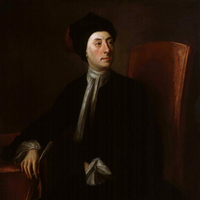To the Countess of Exeter. Playing on the Lute
What charms you have, from what high race you sprung,
Have been the pleasing subjects of my song:
Unskill’d and young, yet something still I writ
Of Ca’ndish’ beauty, join’d to Cecil’s wit.
But when you please to show the labouring muse
What greater theme your music can produce,
My babbling praises I repeat no more,
But hear, rejoice, stand silent, and adore.
The Persians thus, first gazing on the sun,
Admired how high ’twas placed, how bright it shone;
But as his power was known their thoughts were raised,
And soon they worshipp’d what at first they praised.
Eliza’s glory lives in Spenser’s song,
And Cowley’s verse keeps fair Orinda young;
That as in birth and beauty you excel,
The muse might dictate and the poet tell:
Your art no other art can speak; and you
To show how well you play, must play anew:
Your music’s power your music must disclose,
For what light is ’tis only light that shows.
Strange force of harmony that thus controls
Our thoughts, and turns and sanctifies our souls.
While with its utmost art your sex could move
Our wonder only or at best our love,
You far above both these your god did place,
That your high power might worldly thoughts destroy,
That with your numbers you our zeal might raise,
And like himself communicate your joy.
When to your native heaven you shall repair,
And with your presence crown the blessings there,
Your lute may wind its strings but little higher
To tune their notes to that immortal quire.
Your art is perfect here; your numbers do
More than our books make the rude atheist know
That there’s a heaven by what he hears below.
As in some piece while Luke his skill exprest,
A cunning angel came and drew the rest,
So when you play, some godhead does impart
Harmonious aid; divinity helps art;
Some cherub finishes what you begun,
And to a miracle improves a tune.
To burning Rome when frantic Nero play’d,
Viewing that face, no more he had survey’d
The raging flames, but, struck with strange surprise,
Confess’d them less than those of Anna’s eyes;
But, had he heard thy lute, he soon had found
His rage eluded and his crime atoned:
Thine, like Amphion’s hand, had waked the stone
And from destruction call’d the rising town;
Malice to music had been forced to yield,
Nor could he burn so fast as thou couldst build.

